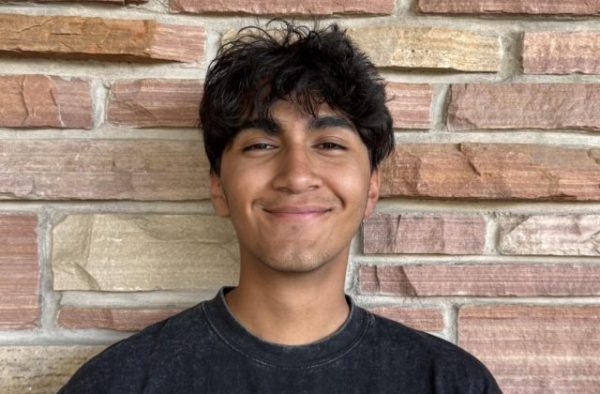Since the inauguration of Donald Trump, many of the systems and structures that support undocumented residents of the United States have either changed or toppled. Facing an unknown future, organizations, community members, and Boulder High School are examining ways to move forward.
Mekela Goehring is the executive director of Rocky Mountain Immigrant Advocacy Network (RMIAN), a nonprofit organization that provides free immigration legal services to people in Colorado. “Unbelievably, there is no right to court-appointed counsel for anyone in immigration removal proceedings,” says Goehring, “even if you are a child or even if you are detained.” RMIAN believes this is unfair, given the complexity of immigration law and the high-stakes nature of these proceedings.
However, Trump’s executive orders have affected RMIAN’s ability to provide what Goehring believes is an essential service. President Trump signed an executive order essentially blocking legal access programs for those appearing before immigration court. “The legal impacts have been immense and, frankly, devastating.” Goehring explains that the executive orders are attempts to “end birthright citizenship, stop refugee admissions…expand detention and deportation without due process… and close the border, even to asylum seekers.”
“All these actions have direct and harmful impacts,” continues Goehring, “from creating a climate where children are afraid to go to school and crime victims are afraid to go to law enforcement to taking away existing protections that will summarily deport individuals to countries where they may face harm and persecution.” These executive orders have also acted to separate families and loved ones.
Some people, with first-hand experience in immigration, compare Trump’s reelection to his first term. One man who lived in Colorado during Trump’s first term saw changes in the way that society viewed Latinos and immigrants in 2016. “I knew people who had problems with immigration,” he says, “because of the situation that Trump has created in respect to his policy towards Latinos.”
Another impact seen by this man is the inability of undocumented people to help each other in meaningful ways. “You can’t do anything as an [undocumented person], just stay out of trouble, try to tell people not to get into trouble…they have the power.”
He also acknowledges a danger beyond policy in Trump’s leadership. “He incites a lot of people to be bad.” Referencing the January 6th attack on the capitol, as well as counterprotesters in America, he feels that immigrants and Latinos have experienced “bad things” both through Trump’s direct actions and through how he has encouraged others to act.
When it comes to the Boulder High community, there are specific worries about immigration, such as the ability of ICE (Immigration Customs Enforcement) to have easier access to schools. While there are still protections in place, it brings up questions about how schools will protect undocumented students.
Mekela Goehring explains that interfering with a student’s public education, including forcing families to provide schools with their immigration status or taking other actions, violates the constitutional principles in Plyler v. Doe. “Schools should make sure that they are creating a welcoming and protective environment for all students, regardless of immigration status,” she says.
Although she acknowledges that there are many unknowns, Boulder High Principal Dr. Morales believes that equal access to education is crucial. “It’s my duty,” she says, “to do everything I can to keep every student in this building safe.” Boulder High does not have any new policies in place specifically dedicated to protecting undocumented students, but Dr. Morales feels that existing safety procedures and policies allow students to remain unharmed and safe within the building.
“Law enforcement is not allowed inside the building,” explains Dr. Morales, “that is an immediate call to our district office for support through our security office and our legal office.” Dr. Morales explains that any immigration official trying to get into the building would “have to get through a lot of layers.” However, if someone did get into the building, along with a call to a district office, there might be a lockdown to protect students.
Dr. Morales also points out that Boulder High’s policy to only have one entrance helps control who goes in and out of the building, especially not allowing doors to be propped open or opened for other students during the day. “It’s safety policies like that, that are so important for a variety of reasons, but this is also one of them.” She also believes that administrators, students, and teachers must be supportive and empathetic to their fellow students who may be impacted for various reasons. Dr. Morales also wants all students to know that the administration intends to offer support to anyone who needs it.
Continue to re-read the whole story in Spanish:
Translation by Mark Gallegos
Desde la inauguración de Donald Trump, varios de los sistemas y las estructuras que apoyan a los residentes indocumentados de los Estados Unidos han cambiado o inclusive se han derrumbado. Presente a un futuro incierto, organizaciones, miembros de comunidades, y Boulder High School están examinando formas de avanzar adelante.
Mekela Goehring es la directora ejecutiva de Rocky Mountain Immigrant Advocacy Network (RMIAN), una organización sin comercio o lucro que brinda servicios legales gratuitos de inmigración para ciudadanos en Colorado. “Increíblemente, no existe el derecho a un judicial apuntar o nombrar a quien sea en un proceso de deportación de inmigrantes,” dice Goehring, “incluso si eres un niño o incluso si estás detenido.” RMIAN cree que esto es injusto, dada la complejidad de la ley de inmigración y el alto riesgo de estos procedimientos.
Sin embargo, las órdenes ejecutivas de Trump han afectado la capacidad de RMIAN para brindar lo que Goehring cree que es un servicio esencial. El presidente Trump firmó una orden ejecutiva que esencialmente bloquea el acceso legal a programas para quienes aparecen ante una corte de inmigración. “Los impactos legales han sido inmensos y, francamente, devastadores.” Goehring explica que las órdenes ejecutivas son intentos para “acabar con la ciudadanía por derecho de nacimiento, detener la admisión de refugiados… extender la detención y la deportación sin un debido proceso… y cerrar la frontera, incluso a los solicitantes de asilo.”
“Todas estas acciones tienen impactos directos y dañinos,” continúa Goehring, “desde crear un clima en el que los niños tienen miedo de ir a la escuela y víctimas de crímenes tienen miedo de ir con oficiales de la ley, hasta eliminar protecciones existentes que deportarán sumariamente a las personas a países donde pueden enfrentar daños y persecución.” Estas órdenes ejecutivas también han actuado para separar a familias y gente que se apoyan uno al otro.
Algunas personas, con experiencia primera en inmigración, comparan la reelección de Trump con su primer mandato. Un hombre que vivió en Colorado en 2016 durante el primer mandato de Trump vio cambios en la forma en que la sociedad veía a los latinos y a los inmigrantes. “Conocí gente que tuvo problemas con la migración,” dice, “por la situación que ha formado Trump en respecto a su política a los latinos.”
Otro impacto visto por este hombre es la inhabilidad de gente indocumentada de ayudarse entre ellos mismos de maneras significativas. “No puedes hacer nada como [una persona indocumentada], simplemente no meterte en problemas, tratar de decir a la gente que no se metan en problemas… ellos tienen el poder.”
También ha reconocido un peligro más allá de la política bajo el liderazgo de Trump. “Él incita mucha a la gente ser malo.” Refiriéndose al ataque del Capitolio en Enero 6, así como a los contra manifestantes en Estados Unidos, el siente que los inmigrantes y los latinos han pasado por “cosas malas,” tanto a través de las acciones directas de Trump, como él ha motivado a los demás actuar.
En respecto a la comunidad de Boulder High, existen preocupaciones específicas sobre la inmigración, como la habilidad de ICE (Immigration Customs Enforce-
ment) de tener un acceso más fácil a las escuelas. Mientras tanto todavía hay protecciones vigentes, plantea preguntas sobre cómo las escuelas protegerán a los estudiantes indocumentados.
Mekela Goehring explica que interfiriendo con la educación pública de los estudiantes, incluso obligando a las familias de proporcionar a las escuelas con sus estatus migratorio o tomando otras acciones, viola los principios constitucionales en Plyler v. Doe. “Las escuelas deben asegurarse de crear un entorno agradable y protector para todos los estudiantes, independientemente de su estatus migratorio,” afirma.
Aunque reconoce que hay muchos desconocidos, la directora de Boulder High, Dr. Morales, cree que es crucial que el acceso a la educación sea igual. “Es mi deber,” afirma, “de hacer todo lo posible para mantener a todos los estudiantes de este edificio protegidos.” Boulder High no tiene ninguna política nueva en su lugar dedicada específicamente a proteger a los estudiantes indocumentados, pero la Dr. Morales cree que los procedimientos y las políticas de seguridad existentes permiten que los estudiantes permanezcan sin daño cualquiera y seguros dentro del edificio.
“No se permite la entrada de agentes de la ley en el edificio,” explica Dr. Morales, “significara es una llamada inmediata a nuestra oficina de distrito para obtener apoyo a través de nuestra oficina de seguridad y nuestra oficina legal.” Dr. Morales explica que cualquier funcionario de inmigración que intente entrar al edificio “tendrá que pasar por muchas capas.” Sin embargo, si alguien entra al edificio, junto con una llamada a la oficina de distrito, podría haber un lockdown para proteger a los estudiantes.
Dr. Morales también señala que la política de Boulder High de solo tener una entrada ayuda a controlar quién entra y sale del edificio, especialmente de no permitir que las puertas quedan emparejadas o dejadas abiertas para otros estudiantes durante el día. “Son políticas de seguridad como esa las que son muy importantes por varias razones, pero esta también es una de ellas.” Ella también cree que los administradores, estudiantes, y maestros/as deben brindar apoyo y ser empáticos a sus compañeros que tal vez estén afectados por diversas razones. Dr. Morales también quiere que todos los estudiantes sepan que la administración tiene la intención de ofrecer apoyo a cualquier persona que lo necesite.




